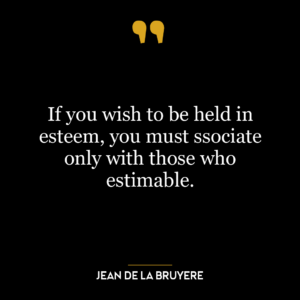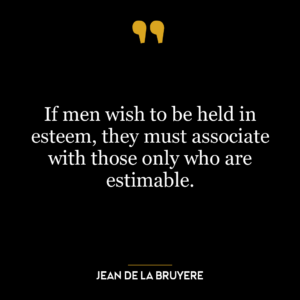This quote emphasizes the importance of character and behavior in shaping our relationships and interactions with others. It underscores the need to conduct ourselves with such integrity, respect, and kindness that others are drawn to us and wish to be our friends. At the same time, it suggests that we should also possess a level of strength, resolve, and principle that discourages others from becoming our enemies.
The quote suggests a delicate balance between approachability and respectability. It implies that one should strive to be both loved and feared – loved for our goodness, and feared for the consequences of crossing our principles. It’s not about instilling fear through threat or intimidation, but rather about commanding respect through our actions and principles.
In today’s world, this idea is still very relevant. In personal development, one can strive to be a person of character, who is kind, respectful, and empathetic, thus attracting friendship. Simultaneously, one should also stand firm in their beliefs and principles, commanding respect and discouraging any ill-will or animosity. This could be applied in various situations, from personal relationships to professional environments.
In a broader societal context, this quote can also be seen as a guiding principle for leaders. A leader who is both loved and respected can inspire loyalty and cooperation, while also maintaining order and discipline. This is particularly critical in today’s complex and polarized world, where leaders need to build bridges and foster unity, while also standing firm against injustices and threats.
Overall, the quote is a call to strive for a balance of love and respect in our dealings with others – to be approachable and kind, yet strong and principled. It’s a reminder that our actions and behaviors shape how others perceive us, and thus, we have the power to influence whether others wish to be our friends or fear to be our enemies.
















